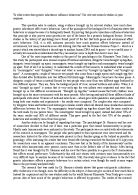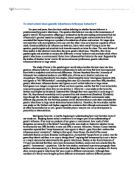Heston, in 1966, conducted an investigation to test to what extent schizophrenia is due to genetic factors. The aim of this experiment was to figure out whether schizophrenia was more influenced by genetics or the environment. This was done by conducting an adoption study, where 47 adults who were adopted yet had biological mothers who had schizophrenia or some form of mental illness and 50 healthy, adopted adults (control) were tested and compared. The results showed that 10% of the adults with schizophrenic mothers were diagnosed with schizophrenia, while no one in the control group was diagnosed with schizophrenia. The diagnosis percentage of schizophrenia is high (5%) in this investigation compared to the fact that only 1% of the world’s population is diagnosed with schizophrenia. The Heston investigation suggests that genetic inheritance influences behavior more than other factors. This is because although both groups were raised in different environments (not with biological family) the adults with schizophrenic mothers still developed schizophrenia whereas the control did not develop this behavior. The results of this experiment suggest that the genetic inheritance has a stronger influence over behavior than environmental factors.
To a lesser extent, there is evidence to suggest that environmental influences may affect human behaviour. This is supported by Scarr and Weignberg (1977) and Horn et al (1979). They both focused on the raising of the adopted and natural children by the parents. They assumed that all the children were raised in the same environment with the same parents. Theoretically, differences between parent and children IQ correlations for adopted and natural children should be attributed to genes. However, the researchers found no significant differences in IQ correlation. This finding was very interesting because the parents who contributed to the studies were wealthy, white and middle class with high IQ whereas the adopted children were from poor, lower-class backgrounds with lower IQ parents. This finding if further supported by Wahlstein’s (1997) research. Wahlstein claims that well-controlled adoption studies conducted in France have found that transferring an infant from a family with a low socio-economic status to a home where the parents have a high socio-economic status improved childhood IQ scores by 12-16 points. This seems to suggest that intelligence can be influenced by environmental factors. An enriched environment may raise IQ in children. However, it is likely there is a strong interaction between genes and the environment to produce intelligence level. Hence, environmental influences may affect human behaviour but not to the same extent as genetic inheritance.
Though the environment can have an effect on behaviour, according to the evidence shown above, research shows that genetic factors impact behaviour to a greater degree. In Heston's study, it was found that schizophrenia and other psycho-social disabilities were diagnosed in the experiment group, showing their genetic inheritance from the biological mothers and the impact of genetics on behaviour; however the environment of being through an adoption process can cause much stress contributing to psycho-social disabilities that the experimental groups were diagnosed with. In Bouchard et al. it was found that 70% of intelligence correlated with genetics despite the different environment of the monozygotic and dizygotic twins and triplets, showing the extent to which genetic inheritance can impact on behaviour. Thus, it is clear that although environmental factors can influence behaviour to a certain extent, genetic inheritance is the stronger influence.
Examine one evolutionary explanation of behaviour
Evolutionary psychology is the approach of explaining human behaviour based on combination of genetics and cognitive science. Evolutionary psychologists try to explain how certain human behaviours are formed by the development of our species over time. Human behaviour is related to natural selection in a sense that mechanisms that produce behaviour are naturally selected in the genes. One example of evolutionary research is the study of emotions. Dan Fessler carried out research on disgust and he aimed to suggest that emotion of disgust was important for the survival of ancestors and their production of offspring. In his study, he investigated the nausea experienced by women in their first trimester of pregnancy. Fessler hypothesised that nausea response helps to compensate for the suppressed immune system. He tested his hypothesis by his experiment by gathering 496 healthy pregnant women between 18 and 50 years and asking them to consider 32 potentially disgusting sceneries. Then Fessler asked a series of questions, designed to determine whether they were experiencing morning sickness. Like his hypothesis, women in their trimester scored much higher in disgust sensitivity than women in their second and third trimesters. In conclusion of his study, natural selection may have helped compensate for the increased susceptibility to disease during this risky period in pregnancy by increasing the urge to be sensitive about food.
Curtis et al (2004) carried out research on the internet to test whether there were patterns in people’s disgust responses. Participants were shown 20 images and for each image they were asked to rank their level of disgust. Among the 20 images were seven pairs in which one was infectious or potentially harmful to the immune system, and the other was visually similar but one infectious. There were 77000 participants from 165 countries. The findings confirmed that the disgust reaction was most strongly elicited for those images which threaten one’s immune system. Interestingly, the disgust reaction also decreased with age. In addition, women had higher disgust than men. In conclusion, this supports the idea of disgust as a key to successful reproduction.
In spite of such evidence, there are some things to consider when examining an evolutionary argument. Since it may be difficult to test empirically some evolution based theories, researchers may be susceptible to confirmation bias – that is, they see what they expect to see. Little is known about the behavior of early Homo sapiens, so statements about how humans used to be are hypothetical. Evolutionary arguments often underestimate the role of cultural/nurture/ the present environmental influences in shaping behavior.
The theories are speculative – it’s difficult to carry out experiments to clearly prove the theories. The researcher Hayes (2005) states that there is a tendency to ignore findings that don’t fit in with the theory –confirmation bias. Evolutionary explanations have also been criticized as being too concerned with past events – the world is very different now – our environment has changed a lot. But evolutionary psychologists use the concept of ‘genome lag’ to explain why such behaviours still exist today.








